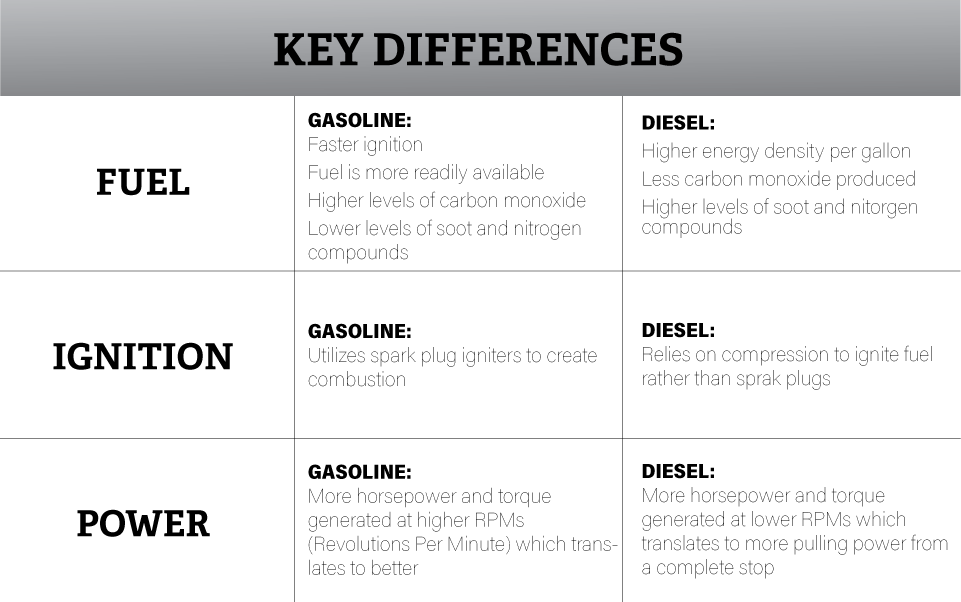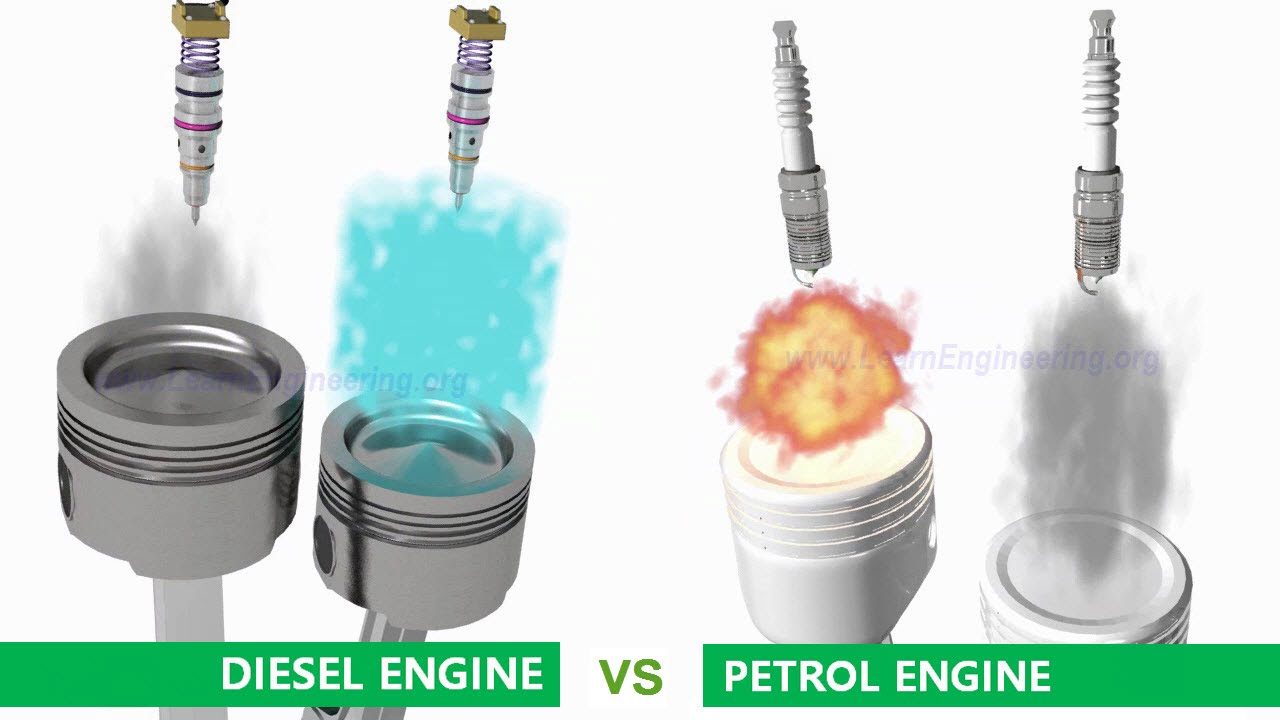Intro-
When it comes to vehicles, one of the biggest decisions is- diesel vs. gasoline Engines. So, what’s the deal? Well, in this article, we’ll break down the differences and help you make an informed choice.
Diesel engines, my friend, are known for their power and fuel efficiency. They have a higher compression ratio and deliver more torque, making them ideal for towing heavy loads or cruising on the highway. On the other hand, gasoline engines are no slouches either. They provide a smooth and quiet ride, making them perfect for city driving and shorter distances.
Now, before you jump to any conclusions, let’s dig deeper into the pros and cons of these engines. Strap in, get ready for the ride, and let’s explore the world of diesel vs. gasoline engines!
| Feature | Diesel Engines | Gasoline Engines |
| Fuel Efficiency | Higher | Lower |
| Torque | Higher | Lower |
| Cost | Higher | Lower |
| Environmental Impact | Lower emissions | Higher emissions |
| Maintenance | Higher | Lower |
Diesel Vs. Gasoline Engines-
It’s important to consider their key features. Diesel engines generally offer higher fuel efficiency, torque, and lower emissions, but they also come with higher costs and maintenance needs. On the other hand, gasoline engines tend to have lower efficiency and torque, but they are more affordable and require less maintenance. Understanding these distinctions can help you make an informed decision when choosing between diesel and gasoline engines.

Source: dealerinspire.com
Diesel vs. Gasoline Engines: Exploring the Key Differences
When it comes to choosing between a diesel and gasoline engine, it’s important to understand the differences and benefits of each. Whether you’re considering buying a new car or looking to upgrade an existing vehicle, this article will provide you with a comprehensive comparison of diesel and gasoline engines. From fuel efficiency to performance, we’ll delve into the various aspects that can help you make an informed decision. So, let’s dive in and explore the world of diesel and gasoline engines!
Benefits of Diesel Engines
Diesel engines have a set of unique advantages that make them a preferred choice for many drivers. Firstly, diesel fuel typically has a higher energy density than gasoline, which means it provides more power per unit of fuel consumed. This results in better fuel efficiency, allowing diesel engines to travel longer distances on a single tank. Additionally, diesel engines often have a longer lifespan due to their robust construction and lower operating temperatures.
Another advantage of diesel engines is their torque output. Torque measures the rotational force of an engine, and diesel engines are known for their high torque levels. This enables them to deliver strong acceleration and towing capabilities, making them popular for larger vehicles such as trucks and SUVs. Furthermore, diesel fuel is less flammable than gasoline, which can be advantageous in terms of safety.
Lastly, diesel engines are often more durable and require less maintenance compared to gasoline engines. The design and construction of diesel engines are inherently robust, resulting in a longer lifespan and fewer mechanical issues. While diesel vehicles may have slightly higher upfront costs, the potential savings from fuel efficiency and maintenance can offset this in the long run.
Benefits of Gasoline Engines
Gasoline engines, on the other hand, come with their own set of benefits that make them a popular choice among drivers. One of the main advantages of gasoline engines is their lower upfront cost. Gasoline vehicles tend to be more affordable compared to their diesel counterparts, making them a more accessible option for many buyers.
Gasoline engines are also generally quieter and smoother in operation compared to diesel engines. The combustion process in gasoline engines is typically more refined, resulting in a quieter and more pleasant driving experience. Additionally, gasoline engines are often lighter and more compact than diesel engines, which can lead to improved handling and maneuverability.
Another benefit of gasoline engines is their availability and infrastructure. Gasoline is widely available at gas stations throughout the world, making it convenient for refueling. On the other hand, diesel fuel may not be as readily accessible in certain areas, especially in remote locations. This can be a crucial factor to consider if you often travel to places with limited diesel fuel availability.
Fuel Efficiency- Diesel Vs. Gasoline Engines
The fuel efficiency of a vehicle is an important consideration for many drivers, as it directly impacts the ongoing cost of ownership. In general, diesel engines tend to be more fuel-efficient compared to gasoline engines. This is due to the higher energy density of diesel fuel and the greater efficiency of the diesel combustion process.
Diesel engines typically achieve higher miles per gallon (mpg) ratings, allowing them to travel longer distances on a single tank of fuel. This can be particularly advantageous for drivers who frequently cover long distances or engage in extensive highway driving. On the other hand, gasoline engines may be more suitable for those who primarily drive in urban areas with shorter trips and frequent stop-and-go traffic.
It’s worth noting that advancements in technology and stricter emissions regulations have significantly improved the fuel efficiency of gasoline engines in recent years. Modern gasoline engines now offer competitive fuel efficiency figures and can sometimes even match or surpass diesel engines in certain scenarios. Moreover, hybrid and electric options are emerging in the market, further expanding the choices for fuel-efficient vehicles.
Performance and Power- Diesel Vs. Gasoline Engines
When it comes to performance and power, diesel engines have an advantage over gasoline engines, especially in terms of torque output. Torque is the twisting force that propels a vehicle forward and enables it to accelerate quickly or tow heavy loads. Diesel engines excel in this area due to their high compression ratios and the characteristics of diesel fuel.
The high torque output of diesel engines results in strong low-end acceleration and towing capabilities. This can be particularly useful for drivers who regularly haul heavy loads or need the extra power for off-road adventures. Diesel engines provide excellent pulling power at low speeds, making them well-suited for tasks that require a lot of grunt, such as towing trailers or carrying heavy cargo.
Gasoline engines, on the other hand, are traditionally known for their higher horsepower ratings. Horsepower is a measure of the sustained power an engine can produce over time. Gasoline engines typically rev higher and provide more power at higher RPMs, allowing for faster acceleration and a sportier driving experience. This can be advantageous for drivers who prioritize speed and responsiveness.
Environmental Impact
The environmental impact of diesel and gasoline engines is a significant factor to consider, especially in today’s era of increasing environmental awareness. It’s important to note that both types of engines have pros and cons in terms of their environmental impact.
Diesel engines have traditionally been associated with higher emissions of nitrogen oxides (NOx) and particulate matter (PM). However, advancements in diesel engine technology and the use of emissions control systems, such as diesel particulate filters (DPF) and selective catalytic reduction (SCR) systems, have significantly reduced these emissions. Modern diesel engines are now cleaner and more efficient, making them compliant with stringent emissions standards.
Gasoline engines, while generally producing fewer NOx and PM emissions compared to older diesel engines, still emit greenhouse gases (GHGs) in the form of carbon dioxide (CO2). CO2 is a major contributor to climate change, and reducing its emissions is a global priority. This has led to the development and adoption of alternative fuel options, such as hybrid and electric vehicles, which offer lower or zero emissions.
Cost Comparison
When considering the cost of owning and maintaining a diesel or gasoline vehicle, several factors come into play. Initially, diesel vehicles tend to have higher upfront costs compared to gasoline vehicles. This is primarily due to the higher cost of diesel engines and the additional technologies required to meet emissions standards.
However, diesel engines often offer better fuel efficiency, resulting in potential long-term savings on fuel costs. Additionally, diesel fuel prices can vary significantly depending on the region and market conditions. In some areas, diesel may be more expensive than gasoline, while in others, it may be cheaper. It’s important to consider the current fuel prices in your area and calculate the anticipated fuel consumption to determine the cost-effectiveness of a diesel vehicle.
In terms of maintenance, diesel engines generally require less frequent servicing compared to gasoline engines. Diesel engines have fewer components prone to wear and tear, and they operate at lower internal temperatures. This can result in lower maintenance costs over the lifespan of a diesel vehicle.
The Future of Diesel and Gasoline Engines: Emerging Trends
As the automotive industry continues to evolve, the future of diesel and gasoline engines is undergoing significant changes. The growing concern for the environment and the need to reduce carbon emissions has prompted a shift towards alternative fuel sources and electrification.
Hybrid vehicles, which combine a gasoline or diesel engine with an electric motor, are becoming increasingly popular. These vehicles offer improved fuel efficiency and reduced emissions compared to traditional internal combustion engines. Plug-in hybrid electric vehicles (PHEVs) go a step further by allowing drivers to charge their vehicles from an external power source, further reducing their reliance on fossil fuels.
Another exciting development is the rise of fully electric vehicles (EVs). EVs are powered exclusively by electric motors and rely on rechargeable batteries for propulsion. They produce zero tailpipe emissions and offer greater energy efficiency compared to internal combustion engines. With advancements in battery technology, EVs are becoming more practical and accessible for everyday use.
The Verdict: Making the Right Choice for You
Choosing between a diesel and gasoline engine ultimately depends on your specific needs, priorities, and preferences. Consider factors such as fuel efficiency, performance requirements, environmental impact, upfront costs, and your driving habits. Additionally, explore alternative options like hybrid vehicles and fully electric vehicles to see if they align with your goals.
Remember, this decision is not just about choosing between diesel and gasoline engines. The automotive industry is rapidly evolving, and the future will bring even more exciting advancements and alternatives. Stay informed, explore your options, and make the choice that best suits your lifestyle and values.
Key Takeaways: Diesel vs. Gasoline Engines
- Diesel engines are more fuel-efficient than gasoline engines.
- Gasoline engines are generally cheaper to maintain and repair.
- Diesel engines have more torque, making them better for towing or hauling heavy loads.
- Gasoline engines are typically quieter and smoother, providing a more comfortable driving experience.
- Diesel fuel is often more expensive than gasoline, but diesel engines can offer better mileage in certain situations.
Frequently Asked Questions
Are you curious about the differences between diesel and gasoline engines? Look no further! We’ve got the answers to your burning questions about these two types of engines.
1. How do diesel and gasoline engines work differently?
Diesel and gasoline engines work on different types of combustion processes. In a gasoline engine, a spark plug ignites a mixture of fuel and air, causing a controlled explosion. This explosion produces the motion needed to power the vehicle. On the other hand, diesel engines compress air to high pressures, which heats up the air. As a result, fuel injected into the cylinder ignites spontaneously, propelling the vehicle forward.
In summary, gasoline engines rely on spark ignition, while diesel engines use compression ignition to generate power.
2. Which engine is more fuel-efficient, diesel or gasoline?
Diesel engines are generally more fuel-efficient than gasoline engines. This is because diesel fuel contains more chemical energy per gallon compared to gasoline. Additionally, diesel engines operate at higher compression ratios, extracting more useful work from the fuel. This allows diesel vehicles to achieve better mileage and save on fuel costs in the long run.
However, it’s important to note that advancements in technology have made gasoline engines more efficient in recent years. Hybrid and electric options are also becoming popular choices for improved fuel efficiency.
3. Are diesel engines more powerful than gasoline engines?
Yes, diesel engines tend to be more powerful than gasoline engines. This is due to their higher compression ratios, which result in greater torque output. Torque is the rotational force responsible for moving the vehicle, and diesel engines excel in delivering higher torque at lower engine speeds.
That being said, gasoline engines have the advantage of higher revolutions per minute (RPM), meaning they can achieve higher top speeds. The power delivery of gasoline engines is also typically smoother and more responsive, which is beneficial for certain types of vehicles and driving styles.
4. Which engine type is more environmentally friendly?
When it comes to environmental impact, it’s a complex comparison between diesel and gasoline engines. Traditionally, gasoline engines were considered cleaner in terms of emissions, as diesel engines produced higher levels of particulate matter and nitrogen oxides (NOx).
However, modern diesel engines have made significant advancements in emission control systems, reducing their environmental impact. Additionally, gasoline engines produce carbon dioxide (CO2) emissions, which contribute to climate change. On the other hand, diesel engines emit less CO2 but produce higher levels of other pollutants.
Ultimately, the environmental friendliness of an engine depends on various factors, including emission control technologies, vehicle maintenance, and fuel sources.
5. Which engine type is better for towing or hauling heavy loads?
If you frequently tow or haul heavy loads, diesel engines are generally the preferred choice. Due to their higher torque output and better low-end power, diesel engines provide more pulling power and are better suited for heavy-duty applications. Whether you need to tow a trailer or carry heavy cargo, a diesel engine will offer greater stability and performance under heavy load conditions.
That being said, advancements in gasoline engine technology, including turbocharging and direct fuel injection, have improved their towing capabilities. If you have specific towing or hauling needs, it’s always best to consult the vehicle manufacturer’s recommendations and consider the specific characteristics of the engine options available.

Source: ytimg.com
Summary
So, to sum it up, diesel engines and gasoline engines are different in how they work. Diesel engines use compression to ignite fuel, while gasoline engines use spark plugs. Diesel engines are more fuel-efficient but emit more pollutants. Gasoline engines are less efficient but produce fewer emissions. Each type has its advantages and disadvantages, so it depends on your needs and priorities. Understanding these differences can help you make an informed decision when choosing an engine for your vehicle.
In conclusion, diesel engines and gasoline engines have their own strengths and weaknesses. It’s important to consider factors such as fuel efficiency and emissions when deciding which type to choose. So, whether you’re thinking about a diesel or a gasoline engine, make sure to weigh the pros and cons before making your final decision.
